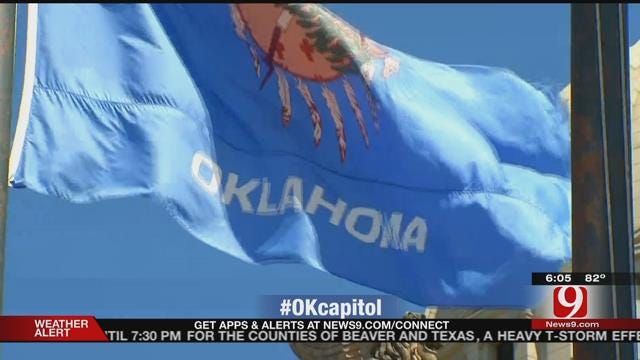Oklahoma Governor, Lawmakers Reach Budget Agreement
<p>Republican legislative leaders say they've reached a budget deal with the governor's office that protects core state services and includes no further cuts to public schools.</p>Tuesday, May 24th 2016, 12:14 pm
Oklahoma Governor and lawmakers have reached a budget agreement on Tuesday.
Governor Mary Fallin, Senate President Pro Tempore Brian Bingman and House Speaker Jeffrey W. Hickman reached a 2017 fiscal year budget agreement that maintains common education funding at current levels, averts closures of hospitals and nursing homes and closes $969.3 million of the $1.3 billion budget gap policymakers faced this legislative session.
If passed by the Legislature, the agreement would set FY 2017 appropriation levels at $6.78 billion, which is $360.7 million, or 5 percent, less than FY 2016 appropriations prior to the midyear revenue failure and $67.8 million, or 1 percent, less than FY 2016 appropriations as adjusted by the midyear revenue failure.
FY 2017 budget agreement spreadsheet
The $1.3 billion budget hole was the largest in state history. Facing that gap, public schools braced for state aid reductions of up to 20 percent and the Oklahoma Health Care Authority had prepared to initiate provider rate cuts of up to 25 percent, which would have caused some hospitals and nursing homes statewide to close or dramatically reduce services.
“Thankfully, those worst-case scenarios can be averted by passing this budget,” said Governor Mary Fallin. “This agreement closes a sizeable portion of a monumental budget hole and prevents the dire, unacceptable outcomes so many Oklahomans have feared may happen this session. There are still reductions in this budget, and it requires more hard votes to pass, but it is certainly a workable budget even amid a major energy sector downturn that is creating difficulties all across Oklahoma. We worked hard to protect key core services - common education, health and human services, corrections, mental health services and the Oklahoma Health Care Authority – while keeping our eight-year transportation infrastructure plan intact.”
By freeing up revenues through tax reform, structural budget changes and cuts elsewhere in government, current funding levels for the State Department of Education are maintained and an additional $83.8 million is appropriated to the Oklahoma Health Care Authority, which will result in negligible provider rate reductions of 3 percent or less that should not cause closures of facilities or reductions of services.
Most agency appropriation reductions from FY 2016 as adjusted by the midyear revenue failure to FY 2017 range from less than 1 percent to 10 percent, with many agencies receiving an approximately 5 percent appropriation reduction for FY 2017.
The agreement maintains existing funding at the Department of Corrections by annualizing the department’s FY 2016 supplemental appropriation of $27.6 million and making no further changes. It also protects critical safety net programs by providing a $16.3 million, or 2.6 percent, appropriation increase to the Department of Human Services that fully funds the Pinnacle Plan and helps maintain other important services.
The Department of Mental Health and Substance Abuse Services receives a $6.9 million, or 2.2 percent, appropriation increase to offset some reductions caused by the midyear FY 2016 revenue failure.
Budget negotiators said more than $2 billion in revenue ideas were considered this session. Some are contained in the agreement, and some were not for a variety of reasons.
“The absence of various revenue measures required deeper reductions to higher education and transportation in order to avoid truly unacceptable funding levels for K-12 schools and hospitals,” said Secretary of Finance, Administration and Information Technology Preston L. Doerflinger. “Transportation and higher education have superior financial positions compared to the rest of government and can absorb reductions far better than common education and health care could. In fact, transportation has said no projects will be significantly altered under this plan, and higher education has already implemented several cost-cutting measures in anticipation of reduced funding. These were difficult decisions, but they had to be made when faced with a challenge of this magnitude.”
Legislative leaders said the agreement can be passed through the Legislature by Friday’s 5 p.m. constitutional deadline to adjourn Sine Die.
“For months, the public has been concerned about the possibility of four-day school weeks and mass closings at rural hospitals and nursing homes because of drastic budget cuts. The budget agreement is a practical solution that closes the shortfall while avoiding extreme cuts and worst-case scenarios in our schools, our hospitals and nursing homes,” Senate President Pro Tempore Brian Bingman said.
“This agreement fully reflects the House Republican priority to see that schools are protected, hospitals stay open and road projects stay on track. It is a balanced approach that reins in tax breaks, responsibly bonds long-term infrastructure and causes agencies to make the difficult spending reductions necessary in a historic oil bust. House members worked harder than ever this session to find conservative solutions to the greatest budget challenge of our generation and we have those solutions in this agreement. We committed months ago to leading our state out of this hole and now we must be committed to seeing this budget through to the finish line,” House Speaker Jeffrey W. Hickman, R-Fairview said.
More Like This
May 24th, 2016
April 23rd, 2025
Top Headlines
April 28th, 2025
April 27th, 2025
April 27th, 2025
April 27th, 2025










